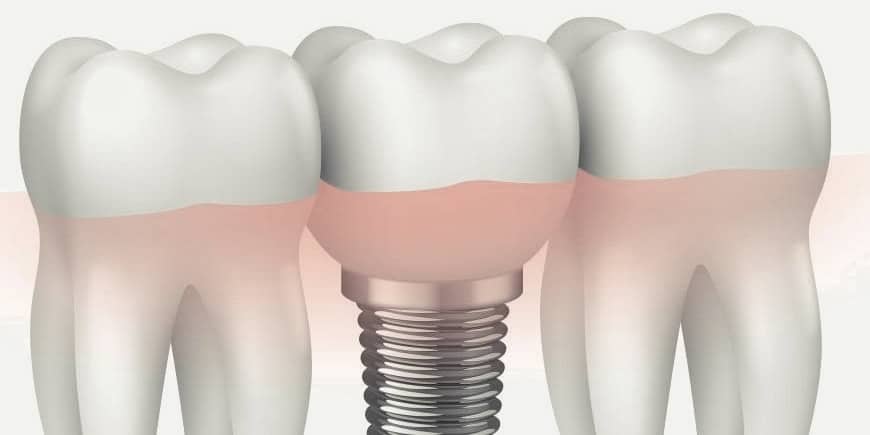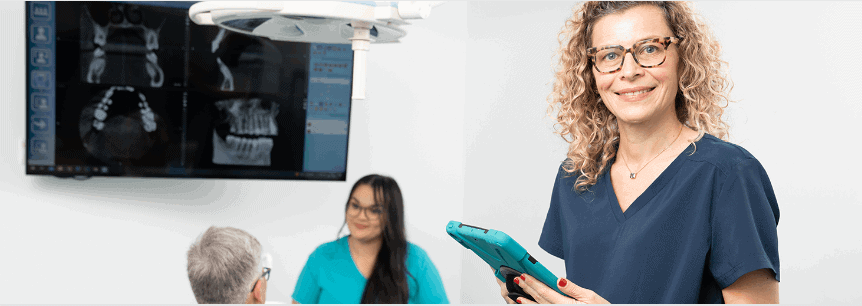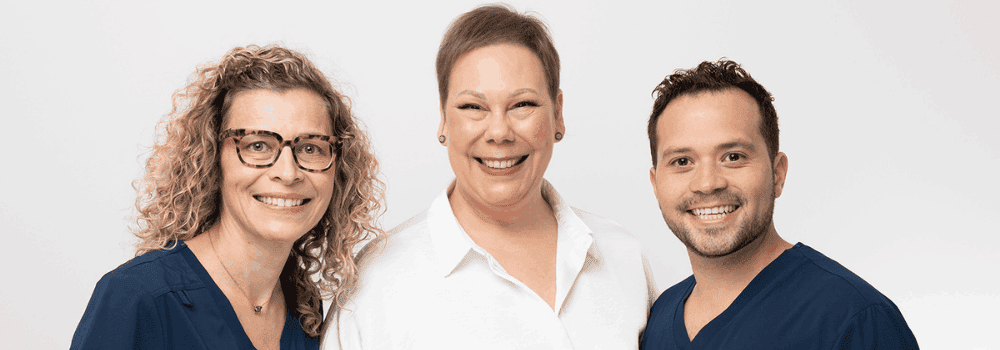Dental implants on the NHS: Everything you need to know!
To get dental implants on the NHS, you need to comply with certain criteria. Find out more about those criterias and the aternatives available to you if you are not eligible!
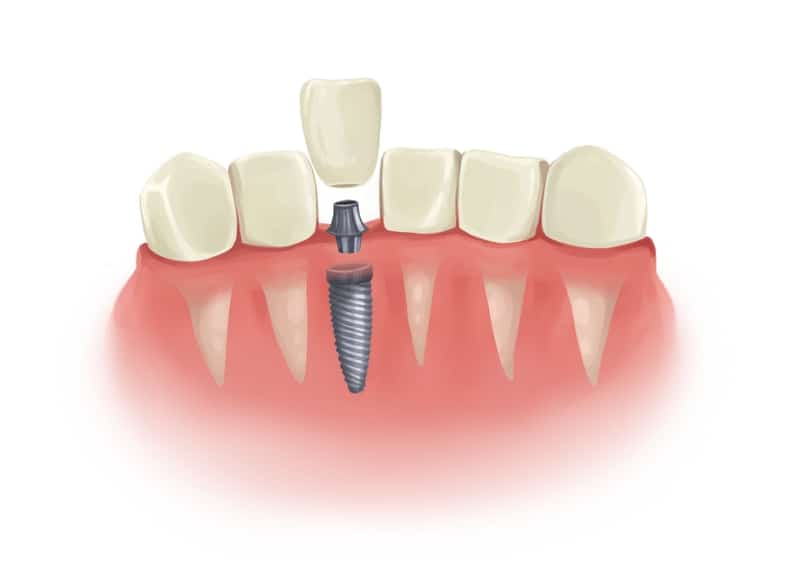
What is a dental implant? 🦷
A dental implant is an artificial root that is usually made out of titanium. It is a material that is perfectly biocompatible with the jaw bone and very resistant overtime. This artificial root is surgically inserted into the jaw, below the gum line. To this dental implant, a ceramic or a zirconium crown is fixed, to act as an artificial tooth.
Who needs dental implants?
Getting a dental implant is the ideal solution for any person missing one or multiple teeth. It is also conventional for patients with failing teeth or damaged teeth to resort to dental implants. Lastly, it is a necessary treatment for person with gum problems or dental diseases as the periodontal illness for example.
Why getting a dental implant?
Nowadays, getting a dental implant is the most effective and long-lasting option to replace one or multiple missing teeth. They allow one to recover their chewing abilities with the strong support provided by the titanium root. Additionally, to the masticatory comfort, dental implants drastically improve the smile by providing an aesthetically pleasing result.
Overall, a dental implant allows anyone to comfortably eat, talk and smile.
How much does a dental implant cost?
Even if getting a dental implant seems to be an ideal solution, many people give up on their dental care because of how pricey this dental treatment is. Indeed, it is an expensive treatment that requires a budget. It can even represent someone’s biggest financial investment if multiple implants are needed. Discover more about dental implants cost.
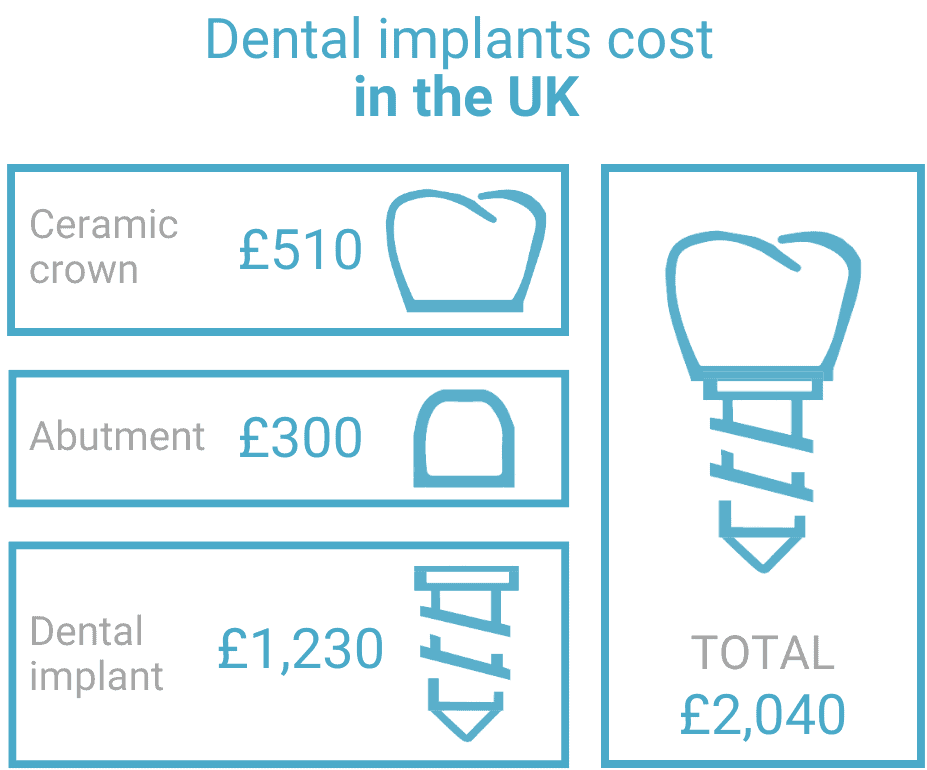
Can I get a dental implant on the NHS? 🇬🇧
Looking at these prices, no wonder why British people want to know if they can get dental implant on the NHS when they seek this type of dental care.
Whilst the National Health Service in the UK covers many basic dental treatments, getting a dental implant on the NHS is a more complex situation. Technically, the NHS does cover dental implants, but there is much more to it.
Dental implants are available on the NHS only in case of a rare, severe and clear medical need. Patients are then prioritized according to their clinical need. Whilst it only represents a limited number of situations, many patients are not eligible for dental implants on the NHS.
As a matter of fact, the NHS only covers dental treatments that are clinically necessary for someone’s mouth, teeth or gums to stay healthy, and free of pain. And even though missing a tooth is a severe issue, it’s not enough to get you considered by NHS. That is because the NHS won’t pay for something that you chose to have for lifestyle reasons and to improve your appearance.
In conclusion, if having a missing tooth is not affecting you medically or clinically, it is unlikely that you will receive help from the NHS.
But why can’t you get a dental implant on the NHS?
This can be explained by the high demand for dental implants through the NHS and the small budget allocated to supply them. After all, the NHS considers that there are cheaper alternatives solutions available to people in need, even though these solutions are far from giving a close result to dental implants.
What are the criteria to get a dental implant on the NHS?
As previously mentioned, patient asking for dental implants on the NHS need to show a medical need for the treatment. Here are the following situations where you can be eligible to receive dental implants:
- Your teeth have been injured following an oral cancer,
- Your teeth have been injured following a severe accident,
- You have received facial trauma through no fault of your own,
- You suffer from total tooth loss and can’t wear dentures,
- You were born with congenital defects such as a cleft lip or pallet or any hereditary or genetic conditions,
- You are below the age of 40 and have lost most or all of your teeth,
- You have lost all of your teeth due to other medical treatments.
In addition to being in one of these situations, you need to comply with general health criteria. Indeed, you need to show good oral hygiene and healthy bones, you need to be a non-smoker, and you need to have no untreated conditions like tooth decay, gum disease or failing restorations. You also need to be registered with a general dentist and prove of regular check-ups. Lastly only adults over 18 years old can pretend to dental implants on the NHS.
Unfortunately, you can also be declined for one the following medical condition:
- You have a poorly controlled diabetes,
- You have any mental health issues,
- You suffer from bruxism.
In order to determine if you are eligible to get dental implants through NHS, you need to ask to your dentist if your treatment is clinically necessary in order to protect your oral health.
Good to know: even if you are eligible to get dental implants on the NHS, the waiting times are very long which discourages many patients.
What are the alternatives to the NHS restriction for dental implants? ✈️
Luckily for you, there are existing alternatives if you are not eligible to receive dental implants under the NHS.
Dentures and dental bridges
The first alternative is to settle for a non-permanent solution because it is way cheaper than dental implants, and it’s also covered by the NHS. You could choose to go for restoration treatments like dentures and bridges.
However, even if these solutions seem cheaper than dental implants in the short term, they are not suitable options for the long term. They need to be changed quite often, they are less resistant overtime and they don’t offer the same strength of support than dental implants. The long-term cost can then become higher. As a matter of fact, getting dental implants requires fewer visits to the dentist then non-permanent solutions.
Private clinics
If you would still like to get dental implants but are not eligible the get them through the NHS, you can opt for private dental care. The primary advantage of doing it with a private dental clinic is the regular appointments and follow-up you are going to get to control your implants. They also have many cosmetic dentistry services available like root canal treatment and dental hygiene care. Going to a private dental clinic regularly allows the dentists to prevent gum disease or mouth cancer for example. Lastly, in addition to doing dental implants, they do fillings, crowns and bridges
However, there is an important disadvantage to going to a private dental clinic: the price. Getting dental implants privately requires an important budget.
Dental tourism
The perfect solution to get dental implants privately and lower the treatment price is dental tourism. If you’ve never heard of dental tourism, it simply is the fact of travelling abroad to get your dental treatment done. The main reason people do travel abroad is because of the lower prices available in those countries.
Every year, many British people seek dental treatment abroad because of the non-support from the NHS. Even though dental tourism requires to travel abroad, the addition of the treatment cost and the cost of travelling stays cheaper than the dental treatment cost in the UK.
However, be guaranteed that lower cost doesn’t mean lower quality. Some highly reputed dental clinics abroad work with the same materials as in the UK, benefit from high-technology machines and the dental teams have level of expertise unequal elsewhere.
The cost difference is mainly explained by the lower cost of living and renting. Additionally, the minimum wage, the tax policies and the operating expenses are lower. This allows private dental clinics to offer high-quality care to more affordable prices.
What is the best destination for dental tourism?
By getting dental implants abroad, patients save up to 60% compared to the UK. On an international level, Turkey and Tunisia are the most popular destinations for patients seeking dental tourism. Even though these 2 countries offer the lowest prices, they use implants brands that are not renowned in the UK or in Europe in general, making the follow-up back home with your local dentist harder.
It is then more responsible for any European patient to seek dental tourism within Europe as the same brand of implants are used (Nobel Biocare, Straumann, Global D, Aadva) and your local dentists will have the required materials to work on them. Among the most popular destinations in Europe, you can find Spain, Portugal, Hungary and Roumania.
The EL CEDRO Barcelona dental clinic 🇪🇸
Based in Spain, El Cedro Barcelona is a modern dental clinic, highly equipped with the latest technology and with a qualified team of dental surgeons and dental assistants. The clinic is managed by Dr Rodriguez who has 23 years of experience in dental surgery and dental implantology. To her side, Dr Montes has been a dental surgeon for the past 10 years now and is specialized in surgical, restorative and regenerative procedures.
In this dental clinic, our patient coordinators, dental surgeons, dental assistants and dental hygienists speak proper English. Additionally, they speak Spanish and French. They can then receive patients from abroad without any communication issues.
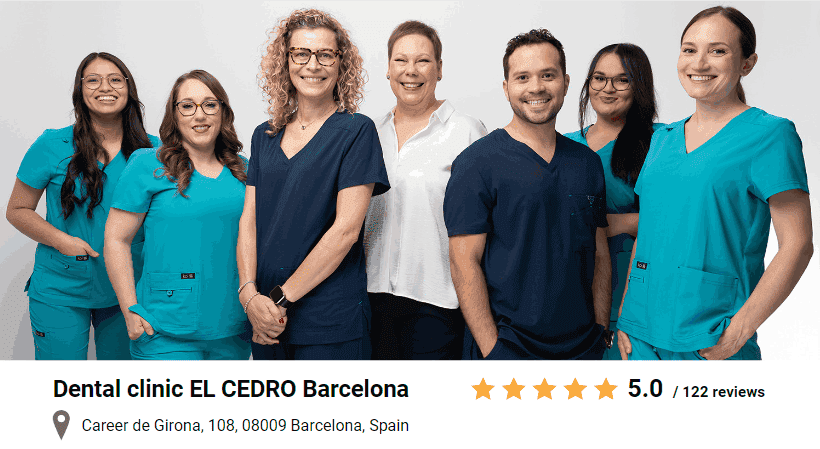
Start your dental journey now! 🦷
At the El Cedro Barcelona dental clinic, you can obtain a free dental quote. For that, just make an online quote request and fill in the form. If you have a recent panoramic X-ray, include it with your request.
Once the dental clinic receives your request, a dentist will examine the panoramic x-ray. They will suggest a suitable dental treatment plan tailored to your specific needs. If you decide to proceed with us, we will propose you an appointment to start your dental treatment.

